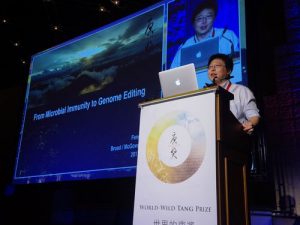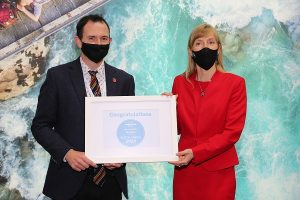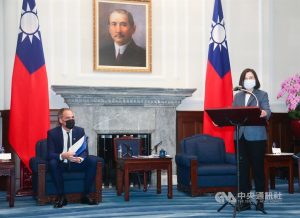
Jerusalem, Sept. 12 (CNA) Chinese American biologist and Tang Prize laureate Feng Zhang (張鋒) has suggested Taiwan invest in basic research and translational research to help establish itself in the global biotechnology sector.
Zhang said the investment in basic research is necessary because the biology of the human body and human cells remains unknown territory, and investing in translational research can help scientists turn basic technologies into useful medicines and therapies.
Investing in those areas could help Taiwan build a foundation and a presence in the biotech sector, Zhang said in an interview with CNA in Jerusalem on Tuesday before delivering a lecture at the annual congress of the Federation of European Biochemical Societies (FEBS).
Translational research has been defined by the National Institutes of Health (NIH) as the process of applying ideas, insights, and discoveries generated through basic scientific inquiry to the treatment or prevention of human disease.
In 2016, Zhang shared the Tang Prize in biopharmaceutical science with Emmanuelle Charpentier of France and Jennifer Doudna of the United States for the development of CRISPR/Cas9 as a breakthrough genome editing platform that promises to revolutionize biochemical research and disease treatment.
In Tuesday’s interview, Zhang told CNA that he is now trying to develop a new genome editing technique with a brand-new algorithm to allow better gene repairing.
He hopes the new technique will be more accurate and efficient than CRISPR/Cas9 and be applied to treating cells in the brain, liver and other organs. If he succeeds, defective genes will be able to be repaired rather than simply being removed, he said.
Speaking of Taiwan and Tang Prize, Zhang said he has had good experiences with Taiwan and that his team has been happy to work with Taiwan and hopes to visit it again.
He also praised the Tang Prize as an award that plays the important role of drawing public attention to scientists and their work, which inspires more people to enter or invest in scientific research.
In his lecture, titled “From Microbial Immunity to Genome Editing,” at the FEBS congress, Zhang introduced the development, applications and research directions of genome editing, and he elaborated on ways to reduce errors in the editing process and improve its accuracy.
Zhang urged more scientists to join in related research, which he described as a broad territory needing joint exploration.
The lecture was jointly organized by the Tang Prize Foundation and the International Union of Biochemistry and Molecular Biology (IUBMB). It drew an audience of more than 1,000 people.
The Taiwan-based foundation formed a nine-year cooperation partnership with the IUBMB — an international non-governmental organization concerned with biochemistry and molecular biology — last year to promote the advancement of biopharmaceutical and biotechnological science education.
The Tang Prize, dubbed the “Asian Nobel Prize,” was established by Taiwanese entrepreneur Samuel Yin (尹衍樑) in 2012 to honor people who have made significant contributions in the fields of sustainable development, biopharmaceutical science, sinology and the rule of law.
(By Charles Kang and Elizabeth Hsu)
Enditem/ls








 The new flight schedule for the W21/22 season began on 31 October 2021. For Budapest Airport, this means an exciting mix of new routes, resumed services, and significant frequency increases.
The new flight schedule for the W21/22 season began on 31 October 2021. For Budapest Airport, this means an exciting mix of new routes, resumed services, and significant frequency increases.


 Intercontinental Hotels and Resorts célèbre son anniversaire de diamant avec éclat, en proposant aux voyageurs
Intercontinental Hotels and Resorts célèbre son anniversaire de diamant avec éclat, en proposant aux voyageurs 




Leave a Reply